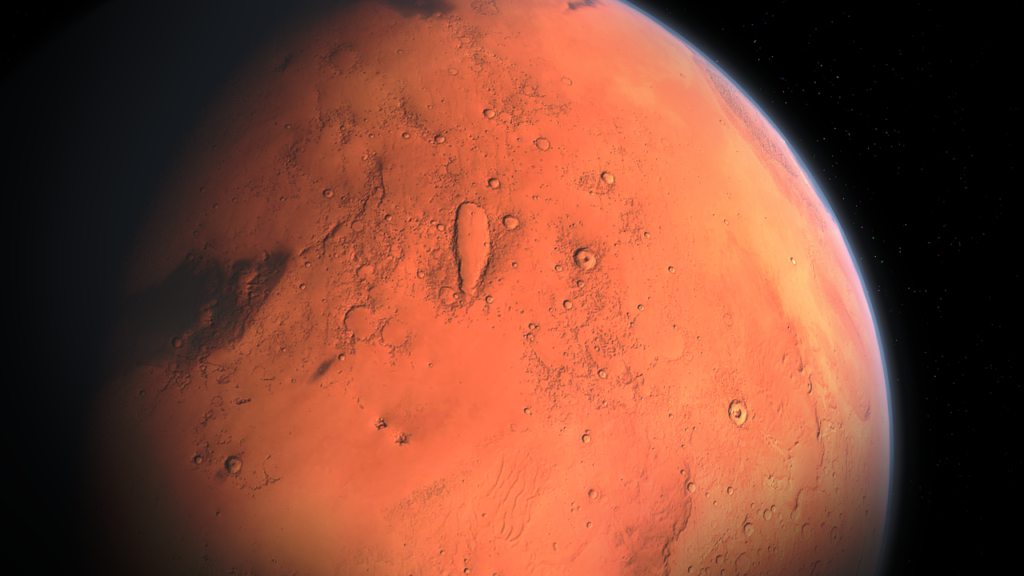Mars and English Literature Posted by Gary Locke on Feb 25, 2021 in Culture
Mars is back in the news. Not that it was ever really out of the news, but Mars has lately become the go-to place in our solar system. A probe launched by the United Arab Emirates, Hope, began orbiting the planet in early February to study the Martian atmosphere. China’s Tianwen-1 landed on Mars a day later. Finally, the rover Perseverance, with its robotic helicopter Ingenuity, landed on February 18. Mars is where all the cool kids are going these days!
The Birth of Science Fiction
However, Mars has long been a source of fascination. Many works of English literature and popular culture have been inspired by the red planet. Most of this can be traced to the work of Italian scientist Giovanni Schiaparelli1https://en.wikipedia.org/wiki/Giovanni_Schiaparelli, who reported finding large channels, or canali, in telescopic observations in 1877. English and American newspapers mistranslated the word as canals, implying that they had been purposely dug on the planet’s surface. Thus, many in the English-speaking world came to believe that Mars had once been, and could still be, inhabited by Martians.
Twenty years after Schiaparelli’s findings, English author H.G. Wells imagined a Martian invasion of Earth in The War of the Worlds. The book sensationally depicts Martians fleeing their dying home planet and attempting to conquer Earth with heat rays and poisonous gas. But, the book also is deeply philosophical and respectful of Charles Darwin’s scientific theory of selectivity. It is one of the very first examples of true science fiction, in which known scientific facts and methods play a significant part in telling the story.
Incidentally, while there have been several retellings of Wells’ book, by far the most effective was a radio adaptation produced by the young Orson Welles and his Mercury Theater Players in 1938. You can read more about this historic broadcast here.
Ray Bradbury and Science Fiction as Literature
Of course, labeling science fiction as literature would have been unthinkable for most of the last hundred years. Serious scholars and critics would have laughed at the idea of ever considering science fiction as important works, worthy of being read and discussed in schools and universities.
One of the first science fiction authors to be taken seriously was Ray Bradbury. Bradbury’s exquisite prose and thoughtful, poetic use of the English language elevated his stories to a level of respect that science fiction had never seen before. His 1950 collection, The Martian Chronicles, imagines almost the exact opposite of Wells’ novel. For Bradbury, man was the invader of Mars, and our desire to extend man’s reach to Mars and other planets could be the ruin of a beautiful world and culture.
Bradbury was important because he was a humanist. He was philosophical and incredibly well-read. He was influenced by poets like John Donne and Robert Frost, and American writers like John Steinbeck and Eudora Welty. Ray Bradbury grew up during the Great Depression. Too poor to go to college, he went to his public library three days a week for ten years. Is it any wonder, then, that Ray Bradbury was the envy of many of the most respected authors of the 20th century?
Mars and the Culture of the 1960s
Robert A. Heinlein’s novel Stranger in a Strange Land, published in 1961, is the story of Valentine Michael Smith, a human who returns to Earth after being raised by Martians. It is, even today, a provocative novel. It was published at a time when Americans were beginning to embrace feminism and environmentalism, and they play an important part in Heinlein’s story. Views of living a nonconformist, untraditional lifestyle were also explored in the book and in American society at the time. Stranger in a Strange Land is about questioning all of what came before 1960 in America, and what the world could be like in the future.
It became a very popular book among the Hippie culture and the anti-war movement of the Vietnam era. In fact, it was the first science fiction novel to become a bestseller. The US Library of Congress named it one of “The Books That Shaped America” in 20122https://www.loc.gov/item/prn-13-005/books-that-shaped-america-on-amazon/2013-01-22/.
Mars has captivated our attention and even found a place in our most beloved literature. I doubt that will ever change.
- 1https://en.wikipedia.org/wiki/Giovanni_Schiaparelli
- 2https://www.loc.gov/item/prn-13-005/books-that-shaped-america-on-amazon/2013-01-22/

Build vocabulary, practice pronunciation, and more with Transparent Language Online. Available anytime, anywhere, on any device.




